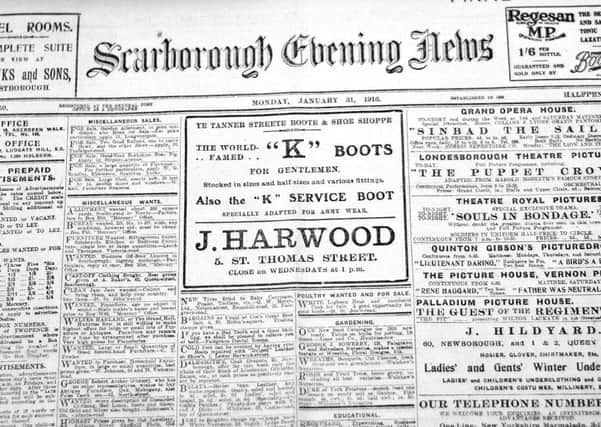1916 court: Boys appear in court for '˜larking at soldiers'


The boys admitted throwing clay “at each other”.
The chief constable said that, in a sense, the cases were trivial, but there might be more serious cases. Boys seemed to have gone mad, so to speak, on fighting battles amongst themselves, on the North Cliff and in the trenches. They threw missiles at each other and there was a great danger to passengers. Some missiles had been known to go over the bungalows and hit people who were quite out of the sight of the boys. He wanted to impress upon boys and parents that they must try and stop that sort of thing. He had had bills posted warning lads against throwing missiles; and asking the public to assist in stopping it.
Special Constable Tucker gave evidence. He caught three of the boys, and one had left his coat, afterwards going back for it, with another boy. Thus he got five out of the six lads.
Advertisement
Hide AdAdvertisement
Hide AdThe boys stated that they were playing the trenches, “larking at soldiers”, as one boy put it. One of the lads ingeniously stated referring to the special constable: “We didn’t recognise him - he had a lady and a girl with him.” (Laughter.)
The offence took place on the afternoon of Saturday February 5th, and the chief constable said that Saturdays and Sundays were the days on which these offences usually took place.
The parent of one of the boys, a man named Hepples, an ex-police officer, said he did not see that reporters should be present - it was a trivial thing. The special constable wanted a job to bother with the lads at all. If he had been an older hand he would not have bothered with them. Proceeding, he alleged that the special constable had made the lads walk in front of him, and had said the chief was a nice man and would probably let them off. “They will let nothing off, I should think,” he added. “I believe he has had a little girl hit with a stone - is that so?”
The chief (to the special constable): Do not answer that question.
Advertisement
Hide AdAdvertisement
Hide AdHepples: It is no good talking if he is a dummy. I should give him the iron cross.
The mother of another boy said: They have to play, they can’t be tied up like little fools.
Another mother: We shall have to have a leash for them when they are out if they can’t play.
Another parent (a father) said the lads must play somewhere, they could not be tied up in an attic.
Advertisement
Hide AdAdvertisement
Hide AdMr Yarborough Anderson: Do you think it desirable that boys should throw clay and stones in a public place?
The man replied that if they threw stones they deserved punishing. They were at a place which was not within the town boundary about twelve months since. It was at Peasholm Bottom, Rawlings’ Field.
Mr Anderson: I didn’t ask you for a speech.
The man: But I can give you one if you want it.
Mr Anderson: You are not doing your case any good.
The man stated that he had to defend his character. He took every care with the lad.
The magistrates, through the chairman, expressed the view that the practice was dangerous, and the police were justified in bringing the cases. The offences took place in a public place (the point had been raised also by Hepples). As it was the lads’ first offence, however, they would only have to pay 1s each towards the costs. The magistrates hoped the cases would be a lesson to them and to others.
The chief constable said that several persons and children had been injured by the throwing of stones within the last few months.